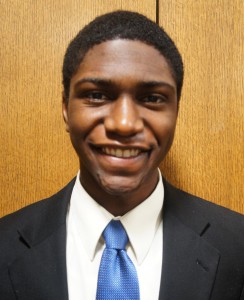An engineering student in the US, Jean-Pierre is the youngest donor to support Ashesi’s new engineering program. Here, he shares what inspired him to give, and how he plans to contribute to global development with his own engineering education.
How did you become connected to Ashesi?
I attend the University of Notre Dame in the United States, where I have met my best friend, Bright Gyamfi, who is from Ghana. During our freshman year in 2012, he learned of Ashesi through his Facebook newsfeed. Given our similar interests in education, he forwarded me the post, and we have been paying attention to Ashesi’s inspiring growth ever since.
In your opinion, why is STEM education so powerful for catalyzing global development?
Among the many benefits associated with a STEM education, the one that I value the most is the ability to create and bring tangible solutions to real life situations. As mentioned by the Ashesi President, Patrick Awuah in his 2007 TED Talk, “The ability to create is the most powerful thing that can happen to an individual”. To this I add that the multiplication of such individuals in a nation is among the most powerful things that can happen to the said nation. A STEM education enables one to go beyond his/her particular field of study. Life’s problems are certainly not linear and cannot be solved with a simple formula; they are problems with multiple equations of multiple variables. The tools acquired through a STEM education enables one to think broadly, focus critically and bring the appropriate solutions to these exact problems. Additionally, a STEM education enables one to be innovative in different fields. Through innovation arise opportunities and when meaningful, these opportunities help individuals improve their living conditions and those of their communities.
What inspired you to support Ashesi’s new engineering program?
In addition to the virtues that I cherish about a STEM education, I especially value Ashesi’s engineering program because of its research focus, quality, and localization aspect. The program forges engineers who are called to be critical of their communities and cultures. While I do believe in the values of a foreign education (namely the broadening of one’s perspectives on different issues) it must also be that those willing to study in their home countries find access to a first-class education, as it ought to bring them the unique opportunity to contextualize their studies in their home environment. Thereby, when individuals trained abroad and locally meet to work on projects, they are more impactful as they engage in dialogues taking a wide set of perspectives into consideration, while keeping the local context vibrant. In order for it to be so, when it comes to quality and access of resources and opportunities, the local education must be on par with that available abroad.
You are studying Electrical Engineering and Economics at Notre Dame. How do you hope to give back through your education? Any post-graduation plans?
I intend to pursue a masters’ degree in Energy Economics and eventually an MBA, given my interests in the renewable energy field. I aim to do so in an international development context with a focus on my homeland of Haiti. My upbringing in Haiti taught me that access to electricity brings meaningful opportunities of different forms. For example, access to electricity makes for prolonged school hours and attracts investors who in turn contribute to the growth and development of impoverished communities. Being aware of this reality, I became interested in renewable energy; notably solar energy and made it a goal to help Haiti identify and implement renewable energy systems to gain clean and affordable access to electricity. Furthermore, given my beliefs and interests in education, I will also contribute in initiatives similar to Ashesi- namely, the creation of sustainable and local bastions of higher learning where flow opportunities of all forms that will significantly contribute to the regeneration of Haiti. At the end of the day, nothing would bring me more joy than participating in the empowerment of individuals.
[x_share title=”Share this story” facebook=”true” twitter=”true” google_plus=”true” linkedin=”true” reddit=”true” email=”true”]


